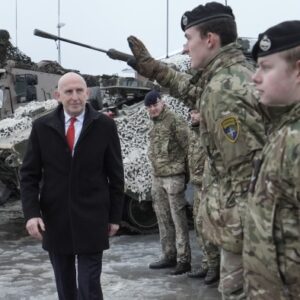
Unlock the Editor’s Digest for free
Roula Khalaf, Editor of the FT, selects her favourite stories in this weekly newsletter.
The world’s largest consumer goods groups have warned that US President Trump’s trade war is denting already fragile consumer sentiment and threatens to leave consumers dealing with a fresh round of price rises.
Food and personal care giants PepsiCo and Procter & Gamble (P&G) cut their financial outlooks for the year on Thursday as a result of tariff-related uncertainty. Meanwhile, Unilever and Nestlé said weary shoppers would have to swallow higher prices.
Pepsi, the maker of soft drinks and Doritos chips, said profits were likely to stagnate in 2025, scrapping a forecast for single-digit growth. The company blamed tariffs and economic uncertainty for a 1.8 per cent drop in sales during the first three months of the year.
“We probably aren’t feeling as good about the consumer now as we were a few months ago,” chief financial officer Jamie Caulfield told analysts.
P&G, whose brands include Tide laundry detergent and Gillette razors, lowered its sales and profit guidance for the year even as it modestly raised prices in the latest quarter.
“The main driver . . . is a more nervous consumer reducing consumption in the short term,” Andre Schulten, chief financial officer, told reporters. He said consumers were taking a “wait and see” attitude because of uncertainty over the stock market, the jobs market, mortgage rates and politics.
P&G now expects organic sales to grow by 2 per cent this year, down from a previous expectation for growth of between 3 per cent and 5 per cent.
The group’s results revealed “just how heavy the external pressures are on the industry”, said Blake Droesch, senior analyst at Emarketer, adding that declining demand in essential categories, such as laundry detergent and toothpaste, underscored the fragility of consumer spending.
P&G’s share price dropped by 5 per cent following the trading update, while Pepsi’s fell 4 per cent.
The warnings from the US consumer goods giants added to widespread corporate concern over the toll Trump’s tariffs will take on the US economy.
While the European consumer groups, Unilever and Nestlé, maintained their financial guidance, they also warned on Thursday of growing consumer unease.
“We entered 2025 with a consumer who was not optimistic, to say the least,” said Nestlé chief executive Laurent Freixe, during an investor call on Thursday.
Fernando Fernandez, newly appointed chief executive of London-listed Unilever, said the direct impact of tariffs on the group’s profitability would be limited, but warned the knock on effects to consumer sentiment still posed risks. Fernandez also cited higher commodity prices and currency volatility as causes for concern.
During a period of high inflation following the Covid-19 pandemic, manufacturers of household brands largely passed on their substantially higher costs on to consumers. However, with Trump’s tariffs threatening to push up inflation once more, there are increasing concerns that many consumers will not stomach further price rises.
Jefferies analyst David Hayes said companies were struggling with how to cover rising costs without losing customers.
“Nestlé and to some extent Unilever were both flagging that the reaction to price rises is still not yet clear,” he said, adding that P&G had indicated they will not be able to fully pass higher costs through to consumers.
Nestlé, the Swiss group behind Nespresso and KitKat, said it had cut prices in the US by 1 per cent in an attempt to win back market share after shoppers traded down to cheaper products — demonstrating the limits of its pricing power.
Fernandez said Unilever was seeing the return of some commodity price inflation, particularly in its personal care and ice cream divisions, but remained “cautious” about raising prices.
The maker of Magnum ice cream and Dove soap increased prices by 1.7 per cent in the first quarter, but the volume of goods it sold rose by only 1.3 per cent. Overall, its underlying sales increased by 3 per cent in the first three months of the year.
P&G’s Schulten said the group would consider raising prices further to compensate for any impact from Trump’s tariffs. The company also plans to look at switching sources of supply, changing how it formulates products and boosting productivity.





